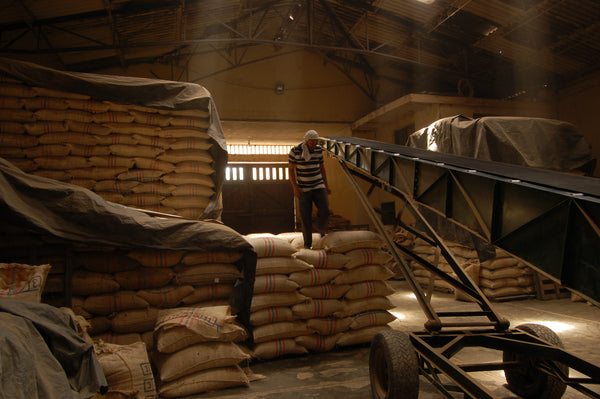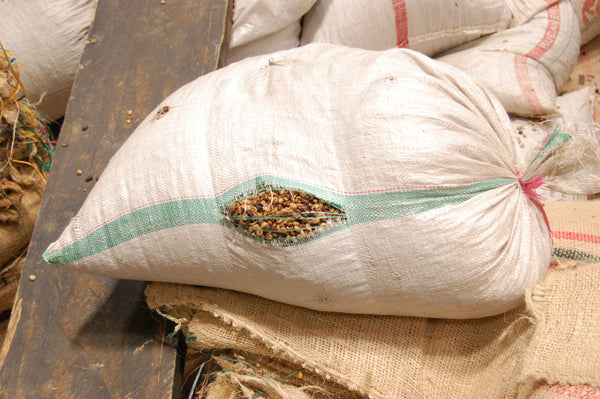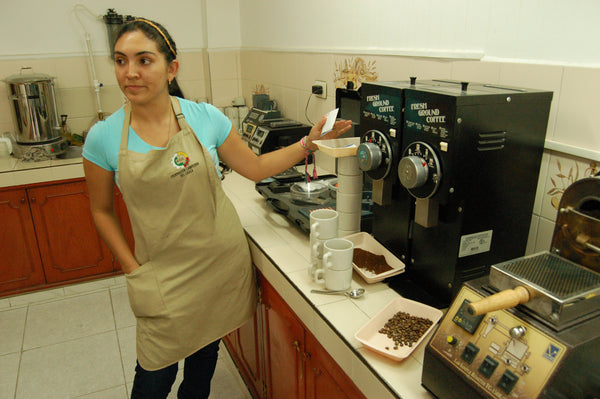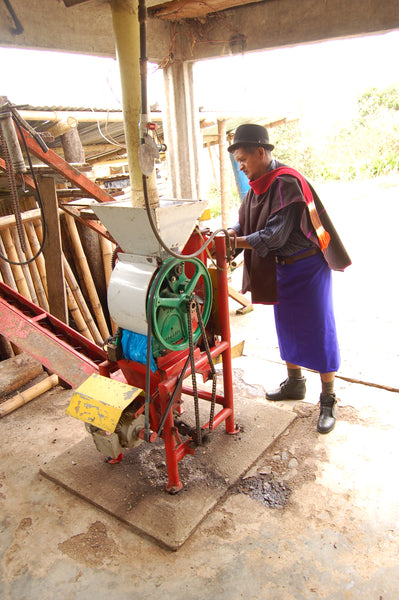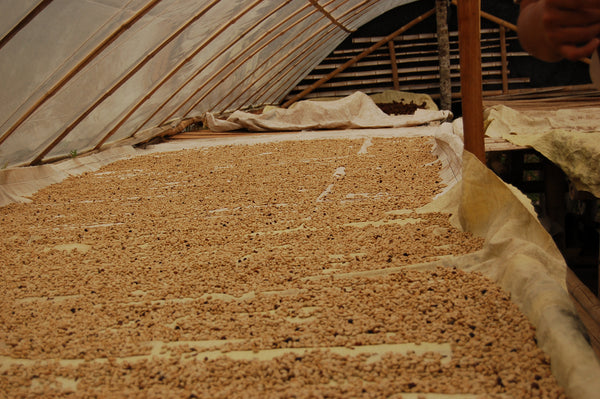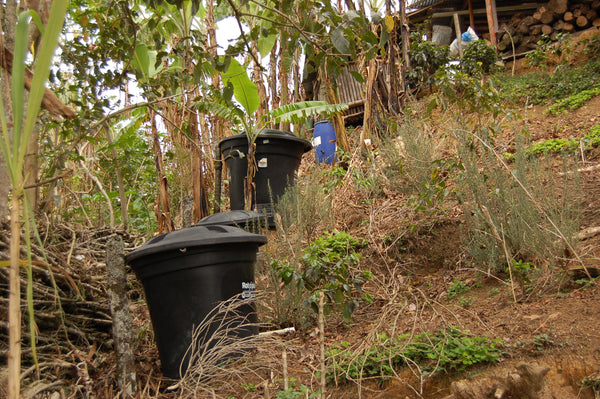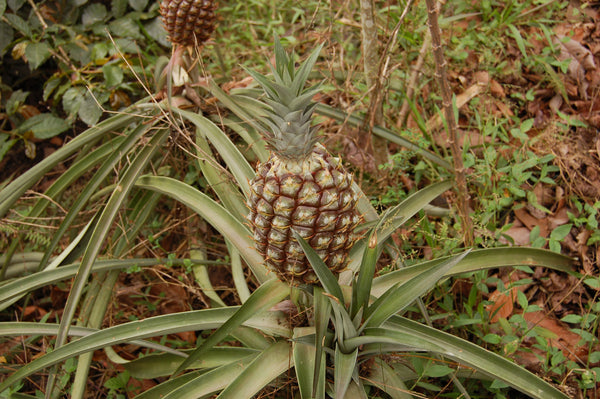Over the last few days (mid-October, 2015) I've been travelling in Colombia. ‘I've met a lot of people, seen a lot of coffee farms’, but the thing I was looking forward to most was meeting our friends at ComepCafe. For those who haven't heard about them so far, that's a cooperative based in Piendamo, Cauca from which we bought our first container of coffee this year. Because we like the quality of the coffee so much, I was really excited to meet them in person and see what exactly is happening there.
On Monday I flew from Bogota to Popayan where I met Luz Stella Reyes, the representative of ComepCafe. First of all we visited local dry mill in Popayan where their coffee is being milled. (above) It's quite a big milling station with some impressive machinery including “electronic eye” - digital sorting machine and other commercial grading equipment. (below)
This station is certified by FNC and has all the tools to sort average coffee into higher quality for export and low quality for national market.(above) Luz explains that all their coffee is hand selected at the farms during/after drying, so they don't pay for the storing, just milling and bagging. She also explains that they're hoping to purchase on small milling machine for themselves, because it's so time consuming to control the process of the milling so there is no damage done to the coffee. If the milling machine is not set up correctly, it can seriously compromise the quality of their coffee, which is something that do not concern commercial milling station.
From there we go to visit one more person in Popayan – Yimara Martinez – who runs a quality control lab. (above) Yimara is the only Q grader in Popayan and their services are very useful. Aside of assessing quality at ComepCafe's QC lab, they also give the samples for professional unbiased opinion. That helps them getting better and gives them confidence when making quality improvement suggestions. We cup some coffees together. It's a selection of local Cauca producers. We can clearly see quite a lot of differences. Overall the quality was good, but one sample stands out. And it's taste is very familiar to me. It's great example of how Cauca coffees should taste like. Incredibly sweet, balanced with juicy acidity, floral notes and long caramel after-taste. So I have only one question: Why is it so much better? I've cupped many coffees here in Colombia and haven't seen such great example of Cauca coffees before. The answer I got was in Spanish meaning something like “you're very young and even more impatient.”
Later on that day we go to Piendamo to meet with regional representatives and other staff. Since the farmers are located in the Cauca mountains, sometimes even few hours drive from Piendamo, they formed about 20 different groups within the cooperative. The president and vice president are being elected from farmers each year. It sound quite political, but it definitely doesn't feel like it when I met them. We all introduced ourselves, spoke about the company and then had a local style dinner. (below)
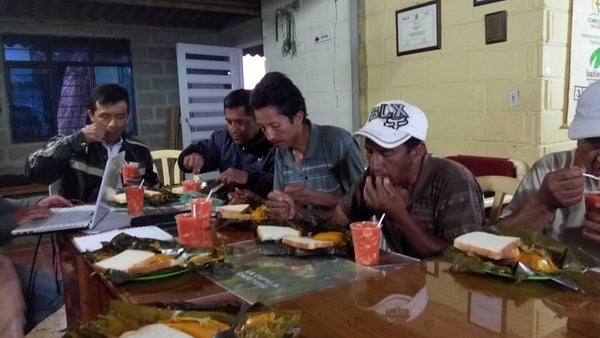
I finally begin to understand what is happening. Long story short, they fell away from FNC because they don't believe in the Castillo varietal. They want to produce coffee organically, because they believe it's sustainable. They want to grow coffee under shade, because it makes the whole ecosystem much more stable. But that's something that is very hard to achieve with Castillo, because it's meant to grow under direct sun. FNC told the farmers to cut down the shade trees, rip out everything they were growing and plant Castillo. Some of the farmers did and now they regret doing so. Some farmers kept growing Caturras, Typicas and Colombia varietal and that's why FNC turned it's back on them. They still need to pay fees from every coffee they produce, but they get no technical support like other farmers. So ComepCafe is providing them all the farmers need and more. They're employing full time agronomist to travel from one farm to another and help the farmers to improve the quality or help them with growing difficulties. ComepCafe also helped all the farmers to build on-farm washing stations with fermentation tanks, pulping machines, parabolic drying tents and even water treatment systems (below). That's quite professional equipment on every single farm. They teach them how to ferment the coffee correctly, wash it and dry it to the correct moisture. This was the answer to my question. I understood that all the farmers want to do grow good coffee. They want to do it right, the farms represent their life. They put a good pride in what they do and that's why it taste so good. I was impressed.
Accidentally it was the week of 5th anniversary of ComepCafe. So they've organised farmers get-together and asked me to introduce our company and have a few words there. (below) It was amazing event; I met vast majority of the farmers of the cooperative. They were genuinely interested in who's drinking their coffee and how they like it. They wanted to know who we are and how well we like what they're doing. All of them made a small presentation about their groups. Many of the farmers grow other crops like maize, mangos, lemons, beans, avocados, bananas, plantains, passion fruit, sugar cane, oranges, etc.. (below) They were exchanging different products here between each groups. All the farmers were very friendly, I got some gifts from which my most favourite was organic mango which you can eat like an apple – with the skin because it's so ripe. (I love mangos)
This trip was amazing experience. We're so proud to buy the first container they've exported themselves and we want to continue supporting their efforts for quality improvements. In just five years they've achieved a lot of good work which made huge difference in the cup. At Bailies we're all proud to roast such extraordinary coffee.
